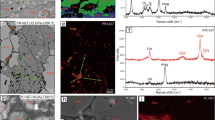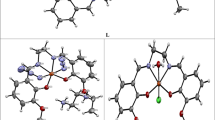Abstract
POTASSIUM ferricyanide and alizarin red S are frequently used as stains for distinguishing between carbonate minerals. Potassium ferricyanide in acid solution produces Turnbull's blue with ferrous iron and it used to be thought that dolomite could be distinguished from calcite on the basis that dolomite alone contained ferrous iron. Recently this has been shown to be incorrect1, and it is now known that any carbonate mineral containing small quantities of ferrous iron will stain with potassium ferricyanide providing the carbonate can be made to react with an acid medium. Recent work2,3 shows that alizarin red S in solution is probably the best method of distinguishing between the common carbonates.
This is a preview of subscription content, access via your institution
Access options
Subscribe to this journal
Receive 51 print issues and online access
$199.00 per year
only $3.90 per issue
Buy this article
- Purchase on SpringerLink
- Instant access to full article PDF
Prices may be subject to local taxes which are calculated during checkout
Similar content being viewed by others
References
Evamy, B. D., Sedimentol., 2, 164 (1963).
Freidman, G. M., J. Sediment. Petrol., 29, 87 (1959).
Warne, S. S. J., J. Sediment. Petrol., 32, 29 (1962).
Author information
Authors and Affiliations
Rights and permissions
About this article
Cite this article
DICKSON, J. A Modified Staining Technique for Carbonates in Thin Section. Nature 205, 587 (1965). https://doi.org/10.1038/205587a0
Issue date:
DOI: https://doi.org/10.1038/205587a0
This article is cited by
-
Characterization of the Gas-Bearing Tight Paleozoic Sandstone Reservoirs of the Risha Field, Jordan: Inferences on Reservoir Quality and Productivity
Arabian Journal for Science and Engineering (2024)
-
Reservoir quality of Upper Cretaceous limestones (Ahlen-Fm., Beckum Member, Münsterland Cretaceous Basin): effects of cementation and compaction on the compactable depositional volume
International Journal of Earth Sciences (2024)
-
Facies development and sedimentology of the Middle Miocene carbonates of the Raghama Formation, northeastern Saudi Arabia
Acta Geochimica (2024)
-
Detailed diagenetic investigation and their impact on the reservoir potential of Upper Cretaceous mixed carbonate-siliciclastic succession, Rakhi Nala Section, Eastern Sulaiman Range, Pakistan
Carbonates and Evaporites (2023)
-
Geological modeling of diagenetic logs of the Sarvak reservoir in Dezful Embayment, southwestern Iran: implications for geostatistical simulation and reservoir quality assessment
Journal of Petroleum Exploration and Production Technology (2023)



